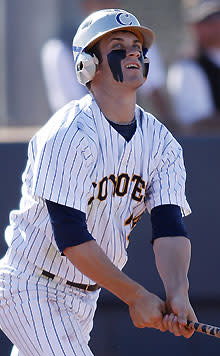Rev up the Bryce Harper hype machine

This was just the start. Bryce Harper, a 17-year-old, got nearly $10 million from the Washington Nationals on Monday night, and it seems big, so big, too big. Actually, it's just right: Welcome to the era of the proto-athlete. There is no such thing as too big, or too anything, for that matter.
Too much? Too soon? Too passé.
Today, an athlete is capable of creating a legacy before he slips on a professional uniform. When Sports Illustrated stuck Harper on its cover as a 16-year-old and compared him to LeBron James, it was right, only not because of their shared ability to dominate their sports as teenagers. Harper is exactly like LeBron because his every move seems designed to further his own brand.
Never will Harper's act devolve into the clown show LeBron puts on because the baseball machine never would prop him up so blatantly and allow him to abuse power. Still, it's frightening to see what Harper has done in his year with the spotlight fixed on him, how he personifies the child of the Internet age through his words and deeds.
He created an avatar for himself: a warrior eyeblacked to the hilt, baseball's version of The Crow. He bought into his own hype by skipping his final two years of high school and enrolling at a junior college in Nevada because he just had to get to the major leagues that much sooner, the extra year of waiting so very, very much to bear. He told the Nationals, through his agent Scott Boras, that he would switch from catcher and play outfield because it would get him to the major leagues that much sooner – and, though it went unsaid, give him a shot at two monster free-agent contracts. Harper even took to Facebook a few weeks back and held a conversation with Manny Machado, the No. 3 overall pick and another Boras client, dreaming about what it would be like to go back to junior college and rip it up in front of crowds of hundreds, which must've seemed like a totally dope negotiating ploy in the minds of a couple of teenagers.
[Photos: See the teen phenom]
And that's the saddest part of this: Harper is still a kid, a kid who knows no better, a kid blessed with remarkable baseball talent and surrounded by people determined to milk it – and him – bone dry. Being a prodigy is an incredibly difficult burden for anyone, let alone someone who plies his talents in public. Harper will be a rousing success or monumental bust. If he isn't the former, he must be the latter.
That is the way of the proto-athlete: star or failure, and nothing in between. Harper is baseball's first true proto-athlete, an individual as consumed with himself as others are with him. Stephen Strasburg(notes) has the talent to be. He's too insular, though, too protective of his family and his privacy to reveal himself to the ravenous public.
By suppressing access to Harper during his season at the College of Southern Nevada, Boras only increased the frenzy. The agent lives in Southern California. He gets how the modern mythmaking machine works. Big debut. Yank him back. Doses here. Doses there. Never too much. Don't want to oversaturate. When you do splash, though, make sure it's like a sumo cannonball.
And Harper's $9.9 million deal, which could reach $10.9 million if he's in the major leagues for the 2014 and 2015 seasons, qualifies. It's the biggest contract for a hitter, eclipsing the $9.5 million of Mark Teixeira(notes) nearly a decade ago, and is second overall to Strasburg's $15.1 million deal last year. One year after he could legally drive, four before he can legally drink, Harper's checking account will include a $6.25 million signing bonus (minus Boras' fees, of course) and plenty more from endorsements.
Oh, that's coming. Earlier this year, the Sports Business Journal sent a survey to baseball writers asking about the game's most marketable players and the most marketable under 25. No matter how unseemly it seemed, I ranked Harper fourth in the latter category. I couldn't deny it: The kid had played the game – the branding game – just right.
How that goes over inside a professional clubhouse will present Harper with his first real challenge. The bat will play, no question, scouts calling his power among the best in the last few decades. The attitude, though? When Kevin Goldstein, the respected minor league reporter for Baseball Prospectus, first alluded to questions about Harper's on-field demeanor – the arrogance, the orneriness, the general attitude – it wasn't just a red flag. It was the first sign.
LeBron could call himself King James because his sport built itself on the star system. Baseball – perhaps to its ultimate disadvantage, but true nevertheless – restrains its best and brightest. If not, the sport's natural order works fine. Too big of a head? A pitcher is more than happy to throw a ball near it.
Harper's got time to fix this, of course, though the probability lessens every day. Now he's not just the kid on the cover of SI, not the one who mashed 31 home runs with a wood bat in a juco league as a teenager, not the No. 1 overall pick. He's the millionaire 10 times over. And with each accomplishment hereon, he'll become that, too, a résumé bound to overflow with more, more, more.
He's big, all right, so big. Too big? Nah. Bryce Harper is just a proto-athlete, baseball's very own LeBron indeed. Cringe at will.
